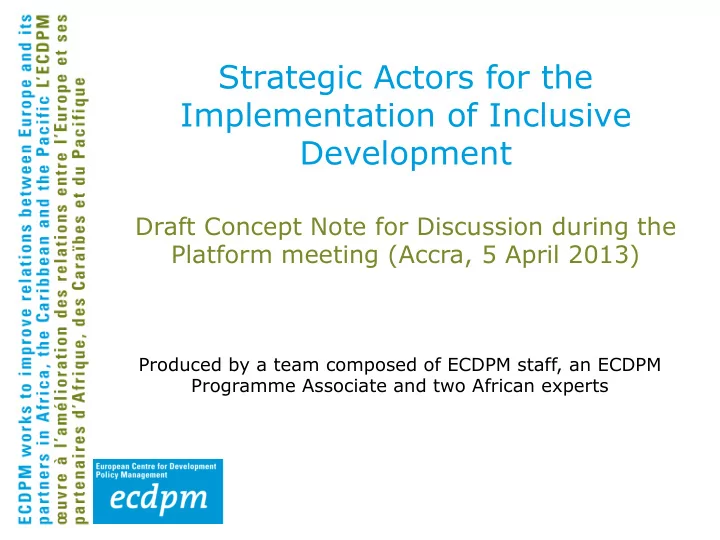

Strategic Actors for the Implementation of Inclusive Development Draft Concept Note for Discussion during the Platform meeting (Accra, 5 April 2013) Produced by a team composed of ECDPM staff, an ECDPM Programme Associate and two African experts
Some preliminary points • This is a “scoping paper”, not a “state of the art” analysis • Purpose: to clarify concepts, delineate the “domains”, map existing research, identify potential niches for future research • No pretention to cover all aspects (vast domain, many research programmes, time limitations) • No mapping of country level situations • Challenging job - Not much “framing” so far ECDPM Page 2
In many ways, the proposed theme seems a “gold mine”… 1) Focus on inclusive “development” (as opposed to inclusive “growth”) 2) Focus on “implementation” (as opposed to traditional focus on “policies”) 3) Focus on “strategic actors” (from state, society and business) that can “push” for effective implementation ECDPM Page 3
1) Inclusive development (ID) on the rise • Growing consensus that failure to tackle inequality is bad for sustainability growth and social cohesion • “Severe economic disparity” number 1 global risk (World Econ. Forum 2013) • ID finding its way in African policy discourse, be it in a rather vague way ECDPM Page 4
2) The mystery of the “Bermuda triangle”: explaining the gap between policy formulation and implementation ECDPM Page 5
Looking below the top of the iceberg 6
“Nudging unwilling actors into action…” ECDPM Page 7
What incentives for change?
3) Strategic actors: Moving beyond political economy analysis to understanding processes of social change • WHO are the “strategic actors” pushing for ID? • WHERE is there “traction” for social change” • HOW is that “traction” translated into effective “action” (how does change occur?) ECDPM Page 9
Clarifying key concepts è INCLUSIVE DEVELOPMENT è STRATEGIC ACTORS ECDPM Page 10
Inclusive development: a concept “under construction” (no shortage of confusion…) ECDPM Page 11
What “animal” are we talking about? ECDPM Page 12
Policy domains where ID could be progressively fostered Equitable economic growth (productive and Inclusive Governance diversified economy , (transparency, income distribution) accountability, local governance, rights, Productive and horizontal inequalities, gainful employment elections) Policy triggers for (decent work) making development inclusive Territorial development Social protection of and spatial equity vulnerable populations Access to basic services (education, health, finance, infrastructure) supported by equitable fiscal systems
Three traps to be avoided è ID as a normative agenda è Need to go beyond policy recommendations (there is no shortage of ideas on “what should be done”) and focus on the “politics” of implementing ID è Don’t forget to look at linkages between these various policy domains ! ECDPM Page 14
Two perspectives on “strategic actors” • Institutional perspective • Agency perspective Attention !!!!! è Both perspectives matter è Connections between actors matter è When are actors “strategic”? è Be aware of dynamic landscape of actors è Focus on conditions that allow strategic actors to translate “traction” into “action” ECDPM Page 15
Mapping existing research MIDDLE ACTION- GRAND LEVEL ORIENTED THEORY THEORY RESEARCH RESEARCH RESEARCH ECDPM Page 16
The policy debate: points of convergence 1. Political nature of development (as opposed to “technocratic approaches”) 2. Need to focus of interests and incentives 3. Importance of “agency” 4. Need to move away from “donor orthodoxies” (e.g. “best practices”, “good governance”) 5. Failure is part of the game 6. Still limited knowledge on how change actually happens and on optimal donor support strategies ECDPM Page 17
The black box of change processes ECDPM Page 18
The policy debate: points of controversy 1. Different “theories of change” (or “routes” to inclusive development) 2. Results-driven (“amoral”) approach vs. “value-driven” approach 3. Top-down state driven transformation and/or societal transformation 4. Discordance on role of governance (APP programme) 5. Added value of “citizen action” for state accountability and donor support to civil society 6. The added value and effective use of political economy 7. The existence and quality of citizen demand (“the docile citizens”) 8. The power and use of social media 9. Desirable degree of donor interventionism ECDPM Page 19
Critical questions regarding “research approach" 1. How to avoid “conceptual trap” regarding ID as Northern (Anglo-Saxon’) donor concept? 2. How to avoid Western bias in agenda setting? 3. How to build on existing knowledge regarding the political economy of reforms/ID? 4. Does the Platform opt for a middle-level theory approach or an action-oriented research, or a combination of both? 5. How to avoid “development recipes” in the push to be “operational”? ECDPM Page 20
Possible options in terms of research focus 1. “More of the same” : deepening existing research themes identified in mapping 2. Focus on less traditional strategic actors 3. Accompany ongoing change processes with action- oriented research 4. Select cases based on “common interests” (local dynamics and donor concerns) 5. Integrate the “political approach” consistently in all research programmes (see par. 90) ECDPM Page 21
Some examples of possible “cases” (reflecting shared agendas) q 6 examples in Note (as illustration of the kind of the “new” topics to be considered) q Discussions of last two days seem to support some of the proposals made q See “hot” debates on the added value of “citizen action for inclusive development” ECDPM Page 22
Thank you www.ecdpm.org www.slideshare.net/ecdpm Page 23
Recommend
More recommend